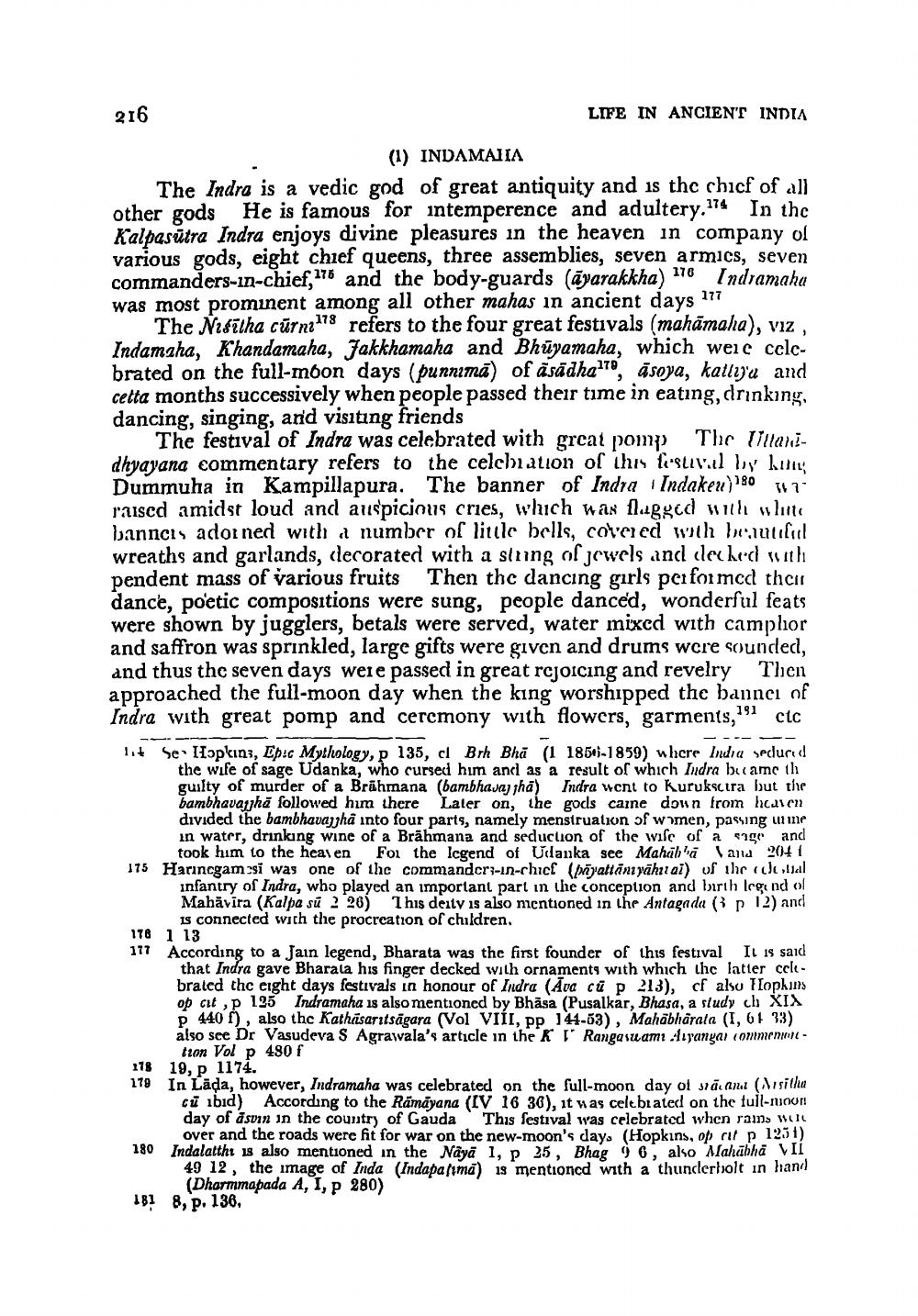________________
216
LIFE IN ANCIENT INDIA
(1) INDAMAIA The Indra is a vedic god of great antiquity and is the chief of all other gods He is famous for intemperence and adultery,174 In the Kalpasūtra Indra enjoys divine pleasures in the heaven in company of various gods, eight chief queens, three assemblies, seven armics, seven commanders-in-chief, 176 and the body-guards (āyarakkha) 170 Indramaha was most prominent among all other mahas in ancient days 177
The Nifilha cūrn: 178 refers to the four great festivals (mahāmaha), viz, Indamaha, Khandamaha, Jakkhamaha and Bhūyamaha, which were celcbrated on the full-moon days (punnima) of asādhao, asoya, katlia and cetta months successively when people passed their time in eating, drinking, dancing, singing, and visiting friends
The festival of Indra was celebrated with great pomp) The Ullanidhyayana commentary refers to the celebration of this fiosuwied ly hum Dummuha in Kampillapura. The banner of India Indakeu) 80 117 raised amidst loud and auspicious cries, which was flagged with white banncts adorned with a number of little bells, covered wth beautiful wreaths and garlands, decorated with a string of jewels and lecked with pendent mass of various fruits Then the dancing girls performed their dance, poetic compositions were sung, people danced, wonderful feats were shown by jugglers, betals were served, water mixed with camplior and saffron was sprinkled, large gifts were given and drums wcre sounded, and thus the seven days were passed in great rejoicing and revelry Thien approached the full-moon day when the king worshipped the bannei of Indra with great pomp and cercmony with flowers, garments,"1 ctc 1.6 Se lopkins, Epic Mythology, p 135, d Brh Bhā (1 1850-1859) where Indra secured
the wife of sage Udanka, who cursed him and as a result of which Indra bu amc th guilty of murder of a Brāhmana (bambhavaj jha) Indra went to Kuruksetra but the bambhavaghă followed him there Later on, the gods caine down from heaven divided the bambhavanghå into four parts, namely menstruation of women, passing urine in water, drinking wine of a Brāhmana and seduction of the wife of a cage and
took him to the heaven For the legend of Udanka see Mahab'a land 2041 175 Harıncgam:si was one of the commander-in-chic rattaniyāhiai) of the ideal
infantry of Indra, who played an important part in the conception and birih legend of Mahāvīra (Kalpa sú 2 20) This deity is also mentioned in the Antagada (p 12) and
is connected with the procreation of children, 176 1 13 177 According to a Jain legend, Bharata was the first founder of this festival IL is said
that Indra gave Bharala his finger decked with ornaments with which thc latter cclebrated the eight days festivals in honour of Indra (Āva cü p 213), cf aku Tophins op cit,p 125 Indramaha is also mentioned by Bhāsa (Pusalkar, Bhasa, a study ch XIX
440 I), also thc Kathisarıtsägara (Vol VIII, pp 144-63), Mahabharata (1,61 33) also see Dr Vasudeva S Agrawala's article in the K 1 Rangasuami Aurangai comment
tron Vol p 480 f 178 19, p 1174. 179 In Lada, however, Indramaha was celebrated on the full-moon day of sinn. ( sitha
cū ibid) According to the Rāmāyana (IV 16 36), it was celebrated on the full-nuoun day of asuin in the country of Gauda. This festival was celebrated when rais wa
over and the roads were fit for war on the new-moon's day. (Hopkins, op at p 1231) 180 Indalatth is also mentioned in the Naya 1, p 25, Bhag 6. ako Alahābha VII
49 12, the image of Inda (Indapa/ima) is mentioncd with a thunderbolt in land
(Dharmmapada A, I, p 280) 181 8, p. 136.
-
---
-
-




